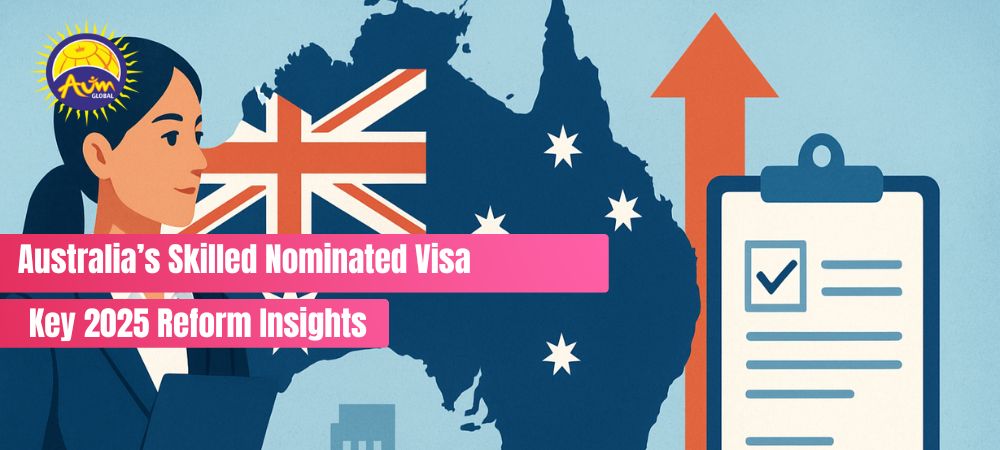
Australia’s migration system is undergoing significant reforms in mid-2025, with the Skilled Nominated Visa (subclass 190) at the forefront of these changes. For skilled professionals eyeing permanent residency through state nomination, the upcoming July–August 2025 updates bring both opportunities and challenges. Understanding these reforms is essential whether you’re applying for the first time, assisting a family member, or working as a third person guiding others in the process. In this comprehensive guide, we’ll explore the key updates, their implications for applicants, and practical steps to adapt to this evolving visa pathway.
The Skilled Nominated Visa, commonly referred to as the subclass 190 visa, is a points-tested permanent residency visa. It allows skilled workers nominated by an Australian state or territory to live and work permanently in Australia. Applicants must:
Submit an Expression of Interest (EOI) via SkillSelect.
Receive a nomination from a state or territory government.
Be invited to apply for the visa.
This visa pathway has been a cornerstone for individuals who may not achieve the competitive points threshold for the Skilled Independent Visa (subclass 189). By securing state nomination, applicants gain access to permanent residency, with obligations to live and contribute in the sponsoring state for at least two years.
The Australian government periodically reviews its migration program to align with economic priorities, labor market shortages, and population planning. The July–August 2025 reforms are particularly significant because:
Focus on Regional and Priority Occupations: States are being given greater flexibility to target critical skills for their economic needs.
Streamlined Processing: Adjustments aim to reduce application bottlenecks and make the system more transparent.
Enhanced Settlement Support: Reforms will introduce better integration support for newcomers in regional areas.
For state nomination applicants, this means the playing field is shifting—criteria may be stricter in some areas but more accessible in others.
Here’s a breakdown of the major updates impacting applicants:
Greater weighting will now be given to applicants with experience in regional areas.
Extra points for occupations listed on state-specific priority lists.
Reduced emphasis on generic work experience, shifting focus to targeted skill areas.
Implication: If you’re applying as a first person with regional study or work experience, you’ll gain a competitive edge.
States will update their occupation lists quarterly instead of annually.
Occupations in demand (such as healthcare, IT, and engineering) will be fast-tracked.
Lower demand roles may face higher nomination thresholds.
Implication: As a second person planning your application, you must closely monitor updates and prepare to act quickly when your occupation becomes available.
While the two-year residency commitment remains, states are offering more support for settlement.
Regional states will provide incentives like relocation grants, job-matching programs, and training subsidies.
Implication: Third person advisors, such as education agents or migration consultant professionals, can better guide clients by highlighting these additional benefits.
From August 2025, applicants must meet higher minimum English test scores.
Proof of continuous language development may be requested in certain occupations.
Implication: Prepare early by upgrading your English proficiency to avoid last-minute rejections.
States will publish real-time updates on their remaining nomination spots.
This transparency ensures applicants can make informed choices before submitting their EOIs.
Implication: Applicants must stay alert and flexible in choosing states based on quota availability.
Despite the changes, the subclass 190 visa continues to be a rewarding pathway to Australian permanent residency. Benefits include:
Permanent Residency: Full work and study rights, with access to Medicare.
Pathway to Citizenship: Eligible after meeting residency and character requirements.
Family Sponsorship: Ability to sponsor relatives once settled.
Supportive Settlement Programs: Especially beneficial in regional states post-2025 reforms.
The reforms bring benefits, but challenges remain:
Increased Competition: With dynamic lists, applicants must be proactive and prepared.
Higher English Standards: May delay applications if language scores aren’t sufficient.
State-Specific Rules: Each state will set unique nomination criteria, requiring tailored applications.
Being aware of these challenges allows you to plan strategically.
Here’s how to stay ahead in the new Skilled Nominated Visa framework:
Regularly Monitor Occupation Lists: Check state websites quarterly.
Enhance Your English Skills: Take preparatory courses well in advance.
Highlight Regional Experience: Even short stints in regional Australia can strengthen your case.
Engage Professional Support: Consulting with a migration consultant can help you avoid costly mistakes.
Stay Flexible: Be open to relocating to different states or regions where demand is higher.
Q1: Will the Skilled Nominated Visa still provide permanent residency?
Yes, the subclass 190 visa remains a permanent residency visa with full rights and benefits.
Q2: Do I need to live in the state that nominates me?
Yes, you must commit to living in the nominating state for at least two years, though settlement support is being expanded.
Q3: How often will state occupation lists change?
From July 2025, updates will occur quarterly, requiring applicants to monitor lists closely.
Q4: What are the new English language requirements?
Exact test score thresholds vary by occupation, but overall requirements are higher than pre-2025 rules.
Q5: Can I still apply if my occupation isn’t on the list?
No, you must wait until your occupation is listed by a state or territory. However, staying prepared allows you to act quickly when it appears.
Q6: How can professional support help with my application?
Working with experts ensures your documents are accurate, deadlines are met, and you receive tailored advice based on state-specific requirements.
Australia’s July–August 2025 reforms to the Skilled Nominated Visa signal a more dynamic, targeted, and competitive system. While the path may be more demanding—with higher English standards and constantly changing occupation lists—it also rewards those prepared to adapt. Applicants who showcase regional experience, closely follow state updates, and invest in strong applications will find ample opportunities for success.
Whether you’re applying for yourself, supporting a loved one, or guiding others, the key lies in preparation, flexibility, and informed decision-making. With the right approach, the Skilled Nominated Visa remains one of the most promising routes to achieving permanent residency in Australia.
